|
|
| |
| EVENTS |
|
|
> Parliamentarians seek a more Effective Role in the Budget-making Process
PILDAT Briefing for Parliamentarians |
| |
|
Briefing
June 11, 2008
Hotel Serena, Islamabad
|
|
| |
Islamabad, June 10; In a PILDAT-organised Briefing Session for Members of Parliament on the �Federal Budget Process�, legislators from the ruling coalition as well as the opposition vowed to assess the upcoming budget in view of the strategies needed on a priority-basis to address the existing socio-economic challenges prevailing in the country. |
|
| |
Veteran Parliamentarians including the Federal Finance Minister, Syed Naveed Qamar and three former Finance Ministers, Senator Ishaq Dar, Mr. Omar Ayub Khan and Senator Prof. Khurshid Ahmed addressed the MPs in addition to other speakers. The Concluding Session of the Briefing was chaired by Mr. Faisal Karim Kundi, Deputy Speaker of the National Assembly of Pakistan. The speakers highlighted the key phases and features of the budget process as well as the important issues that Parliamentarians can and should raise to perform their oversight functions effectively.
|
|
| |
Introducing the topic of the Briefing, PILDAT�s Executive Director Mr. Ahmed Bilal Mehboob said that passing the budget is one of the most important powers and responsibilities of elected representatives of the people. He highlighted that PILDAT has been working very closely with the Parliament and Parliamentarians to bring in needed reforms to the budget process in Pakistan to ensure parliamentary assent to the budget moves beyond its symbolic value at present. He outlined 5 major areas requiring reform of the budget process according to PILDAT: First: There should be an effective mechanism to invite and receive Pre-Budget proposals from the Parliament and its Committees especially on the Annual Development Programme. Second: The period between the presentation of the Budget in the Parliament and its passage should be extended to at least 60 days. Third: Parliamentary Standing Committees should have a key role to play in budget review, especially Demands for Grants of each Ministry should be reviewed in detail in the respective Standing Committees and their recommendations be discussed in the plenary session. Fourth: Defence Budget in adequate details should be a part of the Budget. He said that despite the fact that the present Government took over at a time when a very short time was remaining in the presentation of the Budget this year, we deeply admire the Government in general and the Ministry of Finance in particular for announcing that the Defence Budget will be presented before the Parliament with details starting from this year (2008-09). Fifth: The Budget is in the form of a voluminous, complex and somewhat technical set of documents. A large number of Parliamentarians have difficulty in understanding the budgetary proposals and their true impact. An adequate arrangement should be made to present an independent analysis of the Budget to the parliamentarians. Alternatively, the Parliamentary parties should be assisted to acquire expert advice for this purpose. |
|
| |
Initiating the discussion with an overview of the budget process, Senator Ishaq Dar, former Federal Minister for Finance, emphasized the Constitutional provision of budgetary oversight functions of the Parliament as given under article 73 and under articles 80-85. He believed that if the Parliament dispenses its oversight functions effectively, situations such as the massive budgetary overrun as witnessed in the fiscal year 2007-2008 which stood equal to nearly 1/4th of the budget for the same period could be avoided. In this context, he advised the parliamentarians to analyze the supplementary grant books provided during the budget session, a practice which was discontinued during the previous three years enabling the government to get away with the massive budget overrun. Senator Dar pointed out the manoeuvring of accounts and the negligence of the last government in letting the over-run for the year 2007 exceed 500 billion Rupees in relation to the total revenue of 1 trillion Rupees for the same period. Similarly, he added that the Parliament needs to question the government when the currency in circulation increases manifold from 640 billion to over 4 trillion notes during an 8-year period (1999-2007) thereby contributing to rising inflation. |
|
| |
Speaking on the topic of �What Influences the Budget?�, Syed Naveed Qamar, Federal Finance Minister, pointed out that the economic conditions prior to the budget had been shaped by the previous economic policies generating growth largely in the financial sector alone. Outlining the priorities of the government with respect to the budget, he added that while overnight reforms in the system are unrealistic, the government has worked on presenting a pro-poor budget focusing on neglected sectors. Addressing the issue of the constraints placed on the budget by international institutions, he added that these institutions remain concerned with retrieving their loans while political and prevailing social conditions of a country do not affect their policy recommendations. |
|
| |
Mr. Omar Ayub Khan, former State Minister for Finance, presented an overview of the budgetary process and highlighted key factors that influence the budget making process in Pakistan which include overall fiscal deficit, revenue generation through direct and indirect taxes, current and development expenditure, public sector development programmes, subsidies and provincial transfers such as the NFC award etc. Of the factors outlined, he attributed the present economic conditions and the increasing debt-GDP ratio to the recent global oil price hikes, political instability in Pakistan and the resultant economic shocks during the last fiscal year as well as the global food crisis as some of the contributing factors. |
|
| |
Speaking on the topic of "Responsibilities of the Parliament and Parliamentarians relating to the Budget Process", Mr. Abid Hasan, former Operation Advisor at the World Bank, said that parliamentarians need to question whether the annual fiscal budget exceeds the range specified under the Fiscal Responsibility Law as it has done in previous years. He further added that borrowing itself is not something to be feared, however, the parliamentarians need to ensure effective utilization of the loans and prevent expenditure under trivial heads. While emphasizing the importance of revenue generation through direct taxes, Mr. Hasan added that the Parliament also has to ensure the nature of the taxes being levied in the budget and ensure the taxes remain progressive in nature. Additionally, he pointed out that unless the parliamentarians ensured adoption of pro-poor the policies and strategies in the budget, the expenditure and allocation of trillion of rupees under the PSDP programmes as done over the years, would not reap any benefits for the masses. |
|
| |
Concluding the proceedings of the briefing session, Deputy Speaker of the National Assembly, Mr. Faisal Karim Kundi pointed out the need to strengthen the capacity of Parliamentarians and Parliamentary staff to analyze the budget, scrutinize relevant reports and understand general economic issues including from a gender perspective, the knowledge of which, he said, remains crucial for efficient scrutiny of the budget. Mr. Kundi lent his support to the capacity building initiatives such as training and professional development of Parliamentarians and Parliamentary staff undertaken by PILDAT and reiterated the commitment to reform the budget process and introduce a more meaningful involvement of Parliament, Parliamentarians and Parliamentary Committees both in the pre-budget stage as well as after the presentation of the budget in the National Assembly. |
|
| |
|
|
| |
|
|
| |
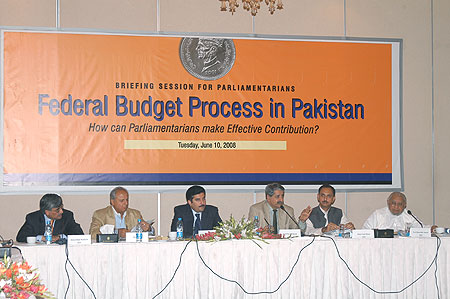
|
|
| |
|
|
| |
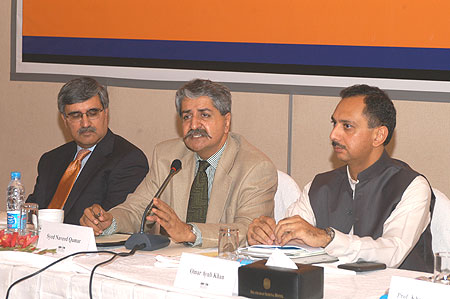
|
|
| |
|
|
| |
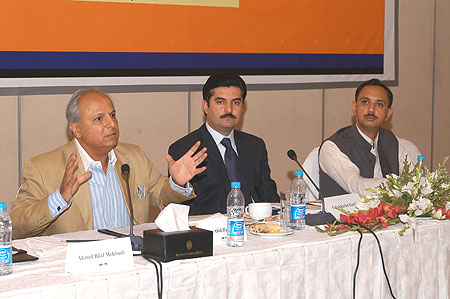
|
|
| |
|
|
| |
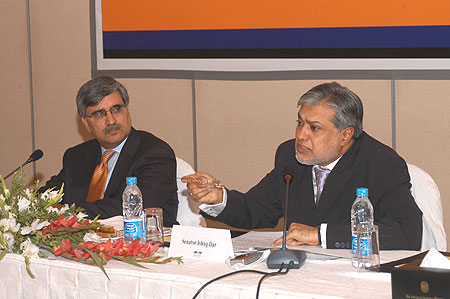
|
|
| |
|
|
| |
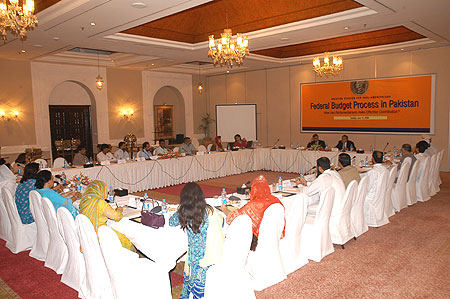
|
|
|
|
|
|
|
|
|